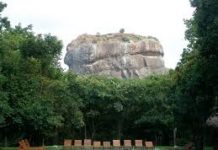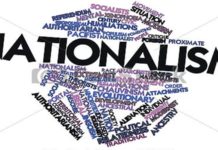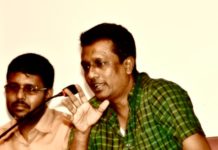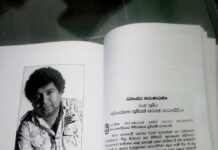හදාරන්න හදාරන්න! Lenin…
‘බියොන්-චෝ හන්’ යනු ”x දර්ශනයට” ඉතා කිට්ටු
ජර්මානූ- කොරියානු දාර්ශනිකයෙකි. ඔහුගේ කෘති ඉතා කෙටිය.
නමුත් අලුත් ආලෝකයක් සපයයි.
“Today, we no longer have any narratives that provide meaning and orientation for our lives. Narratives crumble and decay into information.”
Byung-Chul Han (born 1959) is a South Korean-born philosopher and cultural theorist living in Germany. He was a professor at the Berlin University of the Arts and still occasionally gives courses there. Much of Han’s writing is characterised by an underlying concern with the situation encountered by human subjects in the fast-paced, technologically-driven state of late capitalism.
- The Burnout Society (Stanford: Stanford University Press, 2015) ISBN 9780804795098.
- The Transparency Society (Stanford: Stanford Briefs, 2015) ISBN 080479460X
- The Agony of Eros (Cambridge, Massachusetts: MIT Press, 2017) ISBN 0262533375
- In the Swarm: Digital Prospects (Cambridge, Massachusetts: MIT Press, 2017), ISBN 0262533367
- Psychopolitics: Neoliberalism and New Technologies of Power (London & New York: Verso Books, 2017) ISBN 9781784785772
- Saving Beauty (Cambridge: Polity Press, 2017) ISBN 9781509515103
- The Scent of Time: A Philosophical Essay on the Art of Lingering (Cambridge: Polity Press, 2017) ISBN 1509516050
- Shanzhai: Deconstruction in Chinese (Cambridge, Massachusetts: MIT Press, 2017) ISBN 0262534363
- The Expulsion of the Other: Society, Perception and Communication Today (Cambridge: Polity Press, 2018) ISBN 1509523065
- Topology of Violence (Cambridge, Massachusetts: MIT Press, 2018) ISBN 9780262534956
- What Is Power? (Cambridge: Polity Press, 2018) ISBN 9781509516100
- Good Entertainment: A Deconstruction of the Western Passion Narrative (Cambridge, Mass.: MIT Press, 2019) ISBN 0262537508
- The Disappearance of Rituals: A Topology of the Present (Cambridge: Polity Press, 2020) ISBN 1509542760
- Capitalism and the Death Drive (Cambridge: Polity Press, 2021) ISBN 9781509545018
- The Palliative Society: Pain Today (Cambridge: Polity Press, 2021) ISBN 9781509547258
- Hyperculture: Culture and Globalisation (Cambridge: Polity Press, 2022) ISBN 9781509546183
- PPPPPPPPPPPPPPPPPPPPPPPPPPPPPPPPPPPPPPPPPPP
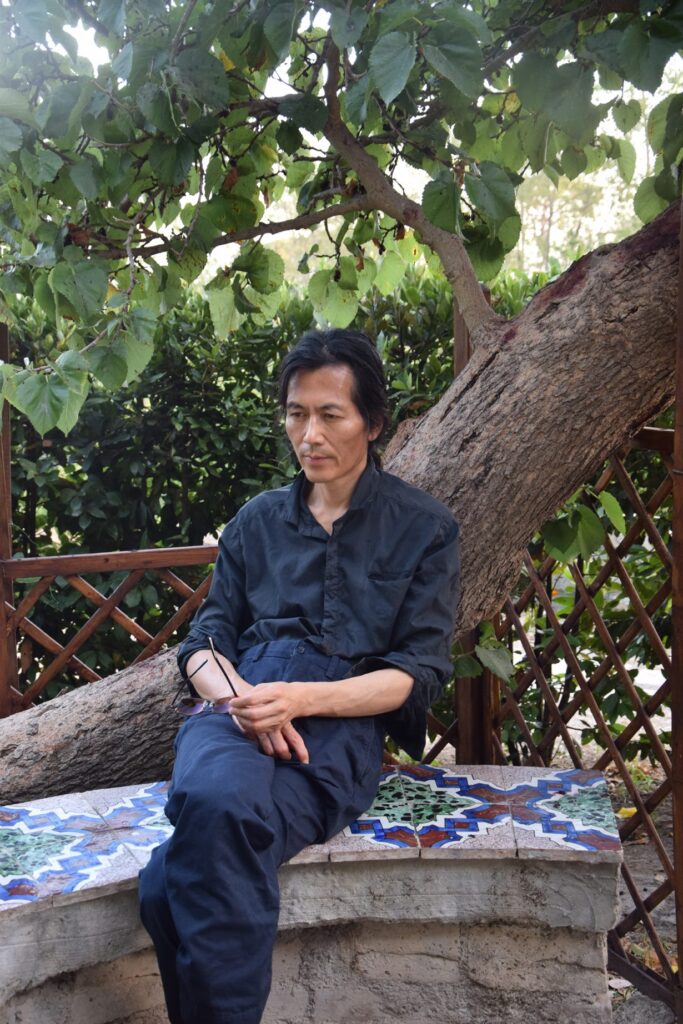
Byung-Chul Han
“Survival will become an absolute, as though we were living in a permanent state of war”. That is how South Korean philosopher Byung-Chul Han described the world after COVID-19, in an interview with Efe: “a society of survival that loses all sense of the good life”, one where “enjoyment is also sacrificed for health”.
Han is one of the leading critics of modern society which he says is pervaded by hyper-transparency and hyper-consumerism, an excess of information and of positivity which inevitably leads society to exhaustion.
He shared with Efe his concerns about how the coronavirus is imposing surveillance regimes and biopolitical quarantines, reducing freedoms, bringing an end to enjoyment, and revealing a lack of humanity amid mass hysteria and fear.
“Death is not democratic”, Han warned while highlighting that COVID-19 has exposed latent social differences, that “the principle of globalization is maximizing profits” and that “capital is misanthropic”. For him, “this has cost a lot of lives in Europe and the USA” at the height of the pandemic.
Byung-Chul Han is convinced that the crisis is also the dawning of a new ear, which will ensure that world power moves a little closer to Asia and away from the West.
COVID-19 has democratized human vulnerability. Do you think we are now more fragile and more easily manipulated? Will we fall more easily into the hands of authoritarianism and populism?
COVID-19 is currently showing that human vulnerability or mortality is not democratic but depends on social status. Death is not democratic. COVID-19 hasn’t changed anything either. Death has never been democratic. The pandemic in particular reveals social upheaval and differences in respective societies. Think about the United States. African-Americans are dying in disproportionate numbers from COVID-19 compared to other groups. The situation is similar in France. What good is the curfew if the suburban trains connecting Paris with lower income suburbs are jam-packed. The working poor with an immigrant background from urban banlieues contract and die of COVID-19. You have to work.
Home office workers cannot afford caregivers, factory workers, cleaners, sellers or garbage collectors. The rich, on the other hand, retreat to their country villa. The pandemic is therefore not only a medical problem, but also a social one. Another reason why not that many people have died in Germany is that social problems are not as serious as in other European countries and the USA. The health care system in Germany is also much better than in the USA, France, England or Italy. But even in Germany, COVID-19 exposes social differences. In Germany, too, the socially weak die earlier. Poor people who cannot afford a car are crowding into full buses, trams and metros. COVID-19 shows that we live in a second-class society. The second problem is that COVID-19 is not conducive to democracy. As is widely known, fear is the cradle for autocracy. In a crisis, people long for strong leaders again. Viktor Orban is benefitting massively from it. It establishes the state of emergency as normal. And that is the end of democracy.
Freedom or security. What is the price we will pay to fight the pandemic?
In the face of the pandemic, we are heading for a biopolitical surveillance regime. Not only in our communication but also our bodies: our health will be subject to digital surveillance. According to Canadian author Naomi Klein, the crisis is a moment that heralds a new system of rules. The pandemic shock will ensure that digital biopolitics takes hold globally that, with its control and monitoring system, seizes control of our bodies in a biopolitical disciplinary society that also constantly monitors our state of health. Faced with the shock of the pandemic, the West will be forced to give up its liberal principles. Then the West faces a biopolitical quarantine society that permanently restricts our freedom.
What are the consequences of fear and insecurity in people’s lives?
The virus is a mirror. It shows what society we live in. We live in a survival society that is ultimately based on fear of death. Today survival is absolute, as if we were in a permanent state of war. All the forces of life are being used to prolong life. A society of survival loses all sense of the good life. Enjoyment is also sacrificed for health that is raised to an end in itself. The rigour of the no-smoking paradigm testifies to the hysteria of survival. The more life is one of survival, the more fear you have of death. The pandemic brings death, which we have carefully suppressed and outsourced, visible again. The constant presence of death in mass media makes people nervous.
The hysteria of survival makes society so inhumane. Your neighbour is a potential virus carrier, someone to stay away from. Older people have to die alone in their nursing homes because nobody is allowed to visit them because of the risk of infection. Is prolonging life by a few months better than dying alone? In our hysteria of survival, we completely forget what a good life is. For survival, we willingly sacrifice everything that makes life worth living: sociability, community and proximity. In view of the pandemic, the radical restriction of fundamental rights is unquestionably accepted.
Religious services are prohibited even at Easter. Priests also practice social distancing and wear protective masks. They totally sacrifice faith for survival. Charity manifests itself as keeping a distance. Virology disempowers theology. Everyone is listening to the virologists who have absolute sovereignty of interpretation. The narrative of resurrection completely gives way to the ideology of health and survival. In the face of the virus, belief degenerates into a farce. And our Pope Francis? Saint Francis has hugged lepers … The fear and panic of the virus are exaggerated. The average age of those who died of COVID-19 in Germany is 80 or 81. The average life expectancy in Germany is 80.5. Our panicked reaction to the virus shows that something is wrong with our society.
Will our society after the coronavirus respect nature more and be more just and fair? Or does it make us more selfish and individualistic?
There is a fairy tale “Sindbad the seafarer”. On a trip, Sindbad arrives at a small island that looks like the garden of Eden. He and his companion feast and enjoy walks on the island. They light a fire and celebrate. Then the island suddenly bends. Trees bend. The island was actually the back of a giant fish that had been motionless for so long that a lot of sand had washed up and trees had grown on it. The heat of the fire on its back has upset the giant fish. It dives deep, and Sindbad is thrown into the sea. This fairy tale is a parable: it teaches that there is fundamental blindness in man. He is not even able to see what he is standing on, so he is working on his own downfall. In view of their rage to destroy, the German writer Arthur Schnitzler compares humanity to an illness. We act like bacteria or a virus on the earth, ruthlessly multiplying and ultimately destroying the host itself. Growth and destruction come together. Schnitzler believes that humans can only recognize primitive orders. He is just as blind to higher orders as the bacteria.
So the history of mankind is an eternal struggle against the divine, which is necessarily destroyed by the human. The pandemic is a result of human ruthlessness. We ruthlessly intervene in a sensitive ecosystem. Palaeontologist Andrew Knoll teaches that man is just the icing on the cake of evolution. The actual cake consists of bacteria and viruses that threaten to break through, or even recapture, that fragile surface at any time. Sindbad the sailor, who believes the back of a fish to be a safe island, is a permanent metaphor for human ignorance. Man thinks he is safe, while it is only a matter of time before he is torn into the abyss by elemental forces. The violence he does to nature strikes back at him with greater force. This is the dialectic of the Anthropocene. In this age of man, man is more threatened than ever.
Is COVID-19 a mortal wound for globalization?
The principle of globalization is maximizing profits. For example, the manufacture of medical devices such as protective masks or medication has been moved to Asia. In Europe and the USA, that has cost a lot of lives. Capital is misanthropic. We no longer do business for people, but for capital. Marx said that capital reduces man to his reproductive organ. Individual freedom, which today has become excessive, is ultimately nothing more than the excess of capital itself. We freely exploit ourselves in the belief that we are fulfilling ourselves. But in reality, we are servants. Kafka has pointed out the paradoxical logic of self-exploitation: the animal wrests the whip from the master and whips itself to become master. In such an absurd situation, people are in the neoliberal regime. Man has to regain freedom for himself.
Will the coronavirus and its consequences change the world order? Who will win the struggle for control and hegemony of world power? Will China step up against the US?
COVID-19 is probably not a good omen for Europe and the USA. The virus is a physical test. Asian countries, which think little of liberalism, got a grip on the pandemic quite quickly, especially with their digital bio-political surveillance, which is unimaginable for the West. Europe and the USA are stumbling. In the face of the pandemic, they are losing their radiance. Zizek has claimed that the virus would bring down China’s regime. Zizek is wrong. None of that will happen. The virus does not stop China’s advance, quite the contrary. China will now also sell its autocratic surveillance state as a successful model against the epidemic. China will demonstrate the superiority of its system to the world with even more pride. COVID-19 will ensure that the world power moves a little further to Asia. Seen in this way, the virus marks the change of an era.






